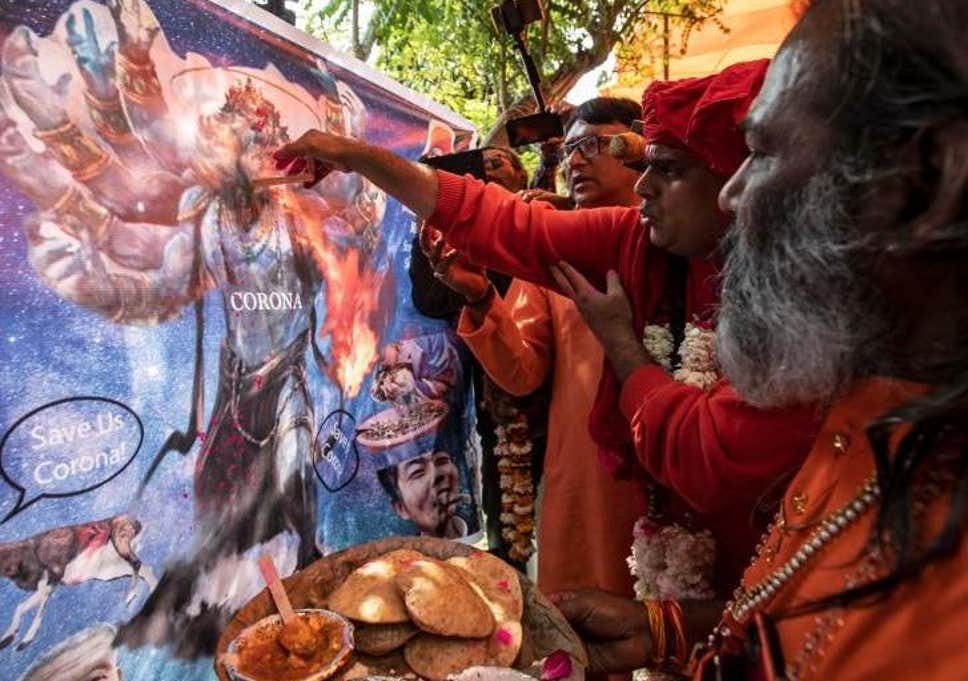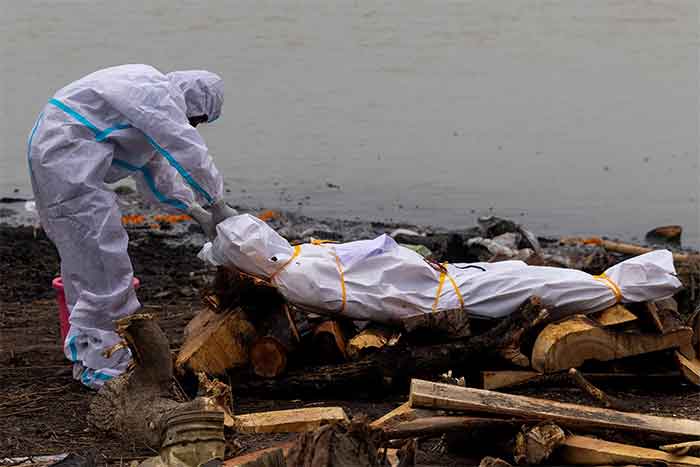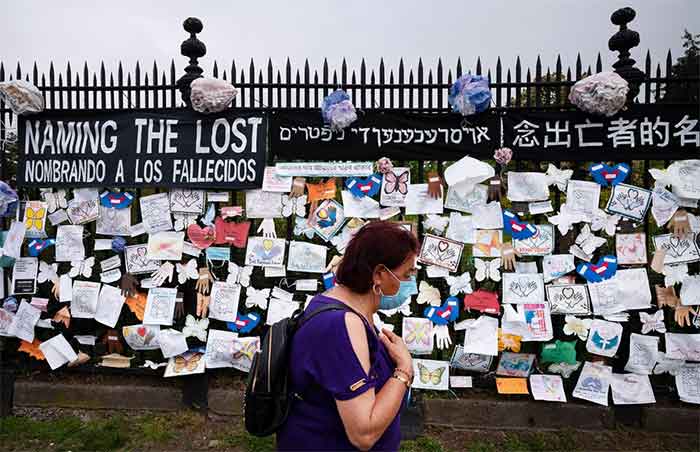Co-Written by Badre Alam Khan & Sanjay Kumar

The scholars have expressed that the pandemic like novel coronavirus that followed by the national lockdown (which was announced by our PM on 24th March) is adversely affecting both sectors like economic and health. Given the week welfare measures and PDS (public distribution system), lives and livelihoods of millions of people mainly migrant workers are facing huge challenges. Before coming to the huge plight of migrants and their problems, let us look at trends reports and increasing graph of coronavirus. So far, numbers of cases across the world have reached at 1,323,641 and as a result, 73,608 people have died. In India, more than 4,780 people tested positive and around 134 deaths took place. The consequences of the pernicious coronavirus will have more severe and even uncontrollable if it will be transmitted at community levels.
Given pathetic conditions of the public health system in our country (such as lack of testing kits, ventilators and other necessary medical equipments), it will be extremely difficult to contain the spread of coronavirus. After sudden and unplanned declaration of 21 days national lockdown (as happened in case of demonetization in 2016 too) migrant workers and extremely poor people have forced to move towards their homes. More than 13 days have been passed so far; however, still, the curve is not getting flattened, as it was expected. Amidst lockdown, daily wages and migrant labourers who have reached their respective villages are also facing socioeconomic and health crisis because of fragile PDS (public distribution system) and lack of delivery such as basic essential services which include foods and medicines with time to the needy people. It is being reported that those migrant labourers who are living in quarantine (social isolation) are not getting proper basic health facilities and hygienic foods. In short, due to unplanned national lockdown, the chaos and massive anxieties are increasing among poor people; the point is also underlined by the opposition parties and civil society members. For a section of scholars, India must emulate the example of South Korea and other developing countries which have contained the spread of lethal coronavirus (by adopting methods of targeted testing of people) to the large extent without taking the step like the national lockdown, as done by developed countries like the USA and Italy.
While addressing problems amidst the lockdown, the Finance Minister has announced 1.7 lakh crore to fight against the threat of virus and provide relief package to the poor, migrant workers and affected people. Besides, the government has also allocated some amounts to build up medical infrastructures like an expansion of quarantine centres, ventilators and texting kits along with good facilities to medical fraternity who are involved in treating people affected by the Covid-19. The economists and social activists have said that given the large scale plight of migrant workers and poor people, the allocated amounts are not sufficient to deal with said problems. That is why social activist Harsh Mander expressed his anguished by underlining that if the poor will not die from a lethal virus; they will definitely die from hunger. Besides, economists have argued that unplanned national lockdown will have a huge economic impact on migrant workers, which will also create more problems like unemployment and lack of proper balance between supply chains and demands in comparison to the demonetization of 2016. To address the problems of poor and migrant workers, the government and respective states must widen the scope of robust welfare measures rather than doing charity, as underlined by Christopher Jafferlot and others. Amidst coronavirus, India is witnessing both health and economic crisis as well, expressed by a noted economist like Jean Dreze. To overcome the crises in both health and economy sectors, central government and respective states have also allocated some amounts to address the said problems. In this respect, Kerala was the first state (which is currently facing challenges to contain the virus) offered a comprehensive relief package and announced worth Rs 20,000 crore, as relief package. The package includes loans for families under various schemes that aim at poverty eradication, women empowerment and providing Rs 1,000 pension to senior citizens.
According to ILO (international labour organization) the report, low wages, and inequality persist in India, despite 7 percent annual average gross domestic product (GDP) growth over the past two decades. In a similar way, the economic survey (2018-19) has revealed that 1 in 3 wage workers are not protected by the minimum wage laws due to the faulty enforcement mechanism. Despite these problems, since the Modi government came into power in 2014, it has launched a massive programme of privatization of the public sectors and brought out new labour laws (for instance, offering cheap laboure to MNCs) which had further curtailed the rights of labourers. That was the reason, the Central Workers Union (CWU) had organized general strike on 8th January 2020 against the economic policy of Modi government. To note that daily wages and migrant workers are facing an economic crisis and huge unemployment because of cuts of budgetary allocations on welfare policies like MANREGA and reduction of funds for SC/STs development programmes.
Keeping the mentioned problems in mind, some scholars are raising their concern that given the health and economic crisis including the lack of the concrete national strategy; the social distancing methods mainly at community levels will not work properly to contain the spread of the Covid-19. While commenting on allocations above mentioned amounts, the scholars said that given the large intensity of crisis both in the economic and health sectors, this is not a sufficient amount to address the challenging task ahead and fulfill the basics needs of the poor and migrant labourers. Given the gravity of situations, it is high time for respective governments both states and centre level must adopt concrete welfare measures, rather than doing charity, as underlined by a section of a scholar. In this respect, Christopher Jafferelot and others have expressed that the government must ensure welfare measures rather than simply depend on the charity (mainly given by the civil society, NGOs and corporates) to address the huge challenges currently created by the Covid-19.
In short, given the scale of huge migrant worker’s plight towards their respective villages, if the government will not adopt robust welfare measures (such as cash transfers, providing essential services and addressing the unemployment of migrant workers etc.), as suggested by economists, the problems of India’s poor will be further exaggerated. Till date in our country, infections of coronavirus is still limited to the largely urban space (Delhi, Mumbai and Pune) and not transmitted at community levels. However, some economists have anticipated that those migrant workers and poor have already moved towards their respective villages (if they will not get basic foods, essential services and medical facilities), methods of social distancing will not going to work. As a result, the lethal virus may permeate at the community levels which will be difficult to contain in times to come. It is crucial to note that like developed countries such as China, the USA and Italy, our the country has not having enough medical facilities like ventilators, testing kits and sufficient quarantine space to contain the spread of viruses’ mainly in the rural areas.
Having said that let us conclude with an optimistic note. The need of the hour is to develop a scientific temper and evidence-based solutions rather than to promote superstitions and adopt medievalistic thinking under the pretext of fighting against the spread of Covid-19. Meanwhile, it is not appropriate time (to any outfit irrespective of caste, creed and religion) to indulge in communal vs. secular and majoritarianism vs. minority fundamentalism binaries (as happening in the case of the Tablighi Jamaat, apolitical religious organization), but to develop the larger social solidarity based on values like humanism, scientific temper and social fraternity, as reminded by our founding Fathers of the nation like Mahatma Gandhi, Nehru, Babasaheb Ambedkar and Mualana Azad and duly enshrined in our Constitution. Just a few days back (on 5th April), our Prime Minister has given a call for lightening candle at night 9 pm; this initiative might have been taken for good intentions, however, have not fully convinced to secular-minded scientific community. Solely because of, how poor and hungry people of our country including those of thousands of people who are currently battling between life and death will get relief from such step without addressing problems as stated above, amidst the spread of Covid-19.
Badre Alam Khan is a research scholar at the University of Delhi and Sanjay Kumar is a former post Doctoral fellow at JNU.
SIGN UP FOR COUNTERCURRENTS DAILY NEWS LETTER
















































